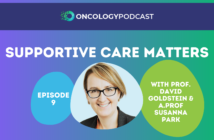By Professor Ian Olver AM, for oncologynews.com.au.
There has been a rapid paradigm shift in anticancer treatment with the introduction of immunotherapy. The spectrum of toxicities of these agents differs markedly from that of conventional cytotoxic chemotherapy.
Many of the early side effects of cytotoxic chemotherapy resulted from them non-selectively targeting tissues with a high growth fraction. This included the cancer but also encompassed normal tissues such as bone marrow, mucosa and hair follicles. Therefore mucositis, neutropenia and thrombocytopenia occurred within days to weeks and then recovered, but the cancer was progressively reduced with repeat dosing. Other toxicities such as vomiting resulted from the body reacting to the toxic chemicals. Over some months selected drugs compromised organ function as a cumulative toxicity. A prime example is anthracyclines causing cardiac toxicity which became measurable after multiple doses. There were late effects such as infertility which with gamete collection prior to chemotherapy could be circumvented. Monitoring for second cancers would aid early detection but changing chemotherapy regimens to reduce exposure to agents such as the alkylating agents could reduce the incidence of second cancers. We became used to the toxicities and their timing and could mitigate some of them; for example with antiemetic prophylaxis or colony stimulating factors to reduce neutropenia.
With immunotherapies, side effects can be the result of overactivity of the immune system resulting in autoimmune effects. These are T-cell mediated with reactions against normal tissues either by the production of high levels of CD4-T-helper cytokines or cytolytic CD8 T-cells migrating into the normal tissues. This can result in inflammation of the liver, lungs, endocrine organs and nerves as well as a range of skin toxicities.
The use of immunotherapies has rapidly accelerated over the past 5 years and it is important that those responsible for the supportive care of patients with cancer rapidly gain experience in managing these new side effects.
The most common side effect of the immunotherapies is fatigue. Some patients also report depression. Other more generic effects are ‘flu-like symptoms with fever, chills, aches and drowsiness with nausea and loss of appetite. A colitis with diarrhoea can result in dehydration if not well supported. Pneumonitis may mimic infection. The skin reactions may not be life threatening, but are uncomfortable because they are often accompanied by itching.
The immune checkpoint inhibitor pembrolizumab which targets PD1, typically causes fatigue in 30% of cases, rash in 20%, and both nausea and vomiting and diarrhoea in 20% of cases as well as many of the inflammatory toxicities discussed above.
These autoimmune side effects can often be managed by stopping the immunotherapy and treating with steroids. This does not necessarily compromise the longer term efficacy of the treatment and as steroids are weaned the immunotherapy agent may be reintroduced, perhaps with a dose reduction, or another agent substituted.
Not all check point inhibitors have the same pattern of side effects. For example the toxicities of Ipilimumab are more dose related than for nivolumab. The incidence of toxicities varies with the histology of the cancer and may be different if treating lung cancer as compared to renal cancer, for example. Pneumonitis is rare with ipilimumab but more common with PD-1 inhibitors such as pembrolizumab. Colitis is more associated with PD-1 blockade with an onset at 4 to 6 weeks and may last for 6 weeks but responds to steroid treatment. Pneumonitis and hepatitis are worse if there is pre-existing organ damage.
The endocrinopathies with immune checkpoint inhibitors include thyroiditis in about 15%, hypophysitis in 9% and more rarely adrenalitis in 1%. The onset is typically 9 weeks after commencing therapy but can range from 5 to 36 weeks. The diagnosis must be considered, since the symptoms may mimic other side effects. Hypothyroidism with fatigue, weakness, and cold intolerance may mimic sepsis, for example. The treatment includes stopping the drug and commencing steroids, but also will require hormone replacement. Although half of the patients recover from thyroid or gonadal dysfunction there is less corticotroph recovery.
The most common skin effect is vitiligo but the spectrum can range from an erythematous rash to Stevens-Johnson syndrome or toxic epidermal necrosis. If there is no skin infection, topical steroids can be used and anti-pruritic medication may need to be administered. Similarly, the mucosa can be affected and here it is important to rule our candida and test for Sjögrens. Ocular toxicity can include uveitis, episcleritis or conjunctivitis.
Neurological toxicities such as Guillain Barre Syndrome or encephalitis are rare. Arthralgias can occur, and my respond to oral steroids or steroids injected into the joint.
Some immunotherapies have a pattern of progression of side effects. Ipilimumab for example will often present with skin toxicities which precede colitis, hepatitis and then the endocrinopathies.
With these less familiar side effects, patients receiving immunotherapies should be reviewed prior to each treatment and a history of specific symptoms including skin changes, diarrhoea, abdominal pain, headache, fever, dyspnoea, cough and neurologic changes should be pursued. Routine blood tests will include haematology, electrolytes and liver function test and endocrine tests such as TSH.
It is usually recommended that discontinuation for grade 2 toxicities may be only temporary but they usually respond to low dose steroids which are then weaned over a month, with more prolonged cover for pneumocystis. Grade 3 or 4 toxicities may require more permanent discontinuation.
The use of immunotherapies has rapidly accelerated over the past 5 years and it is important that those responsible for the supportive care of patients with cancer rapidly gain experience in managing these new side effects.



